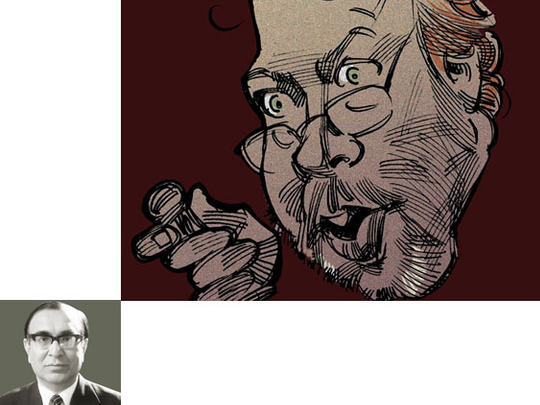
All across the world of Islam, we find responsible thinkers, analysts and creative writers engaged in deep introspection on how their societies became vulnerable to religious extremism and how this issue became a casus belli for the West.
Some of the affluent Arab states invest considerable sums of money in the promotion of inter-faith harmony and understanding. Many intellectuals from the West respond positively and help place issues in a constructive perspective.
Unfortunately, the dominant trend in the West continues to be the exploitation of terrorism to demonise Islam. This becomes particularly noticeable when writers of repute give up all pretence to objectivity and weigh in on the side of low order propagandists against the Muslim world.
Christopher Hitchens is a famous British writer who migrated to the United States some 20 years ago. In due course he abandoned his leftist past and became an ardent neo-conservative.
He also claimed a Jewish lineage on facts that his own brother considers rather exaggerated. In internal debates on both sides of the Atlantic, he fiercely supported the invasion of Iraq. In the latest issue of Vanity Fair he returns to Pakistan, a country that arouses visceral hatred in him and lambasts it in a language that does not fight shy of using four-lettered words.
The occasion is the hunting down of Osama Bin Laden in Pakistan. The very opening of his polemic, however, shows that he wants to use the incident to attack the Pakistani society from every conceivable angle. So blatant and biased is the denunciation of Pakistan that the best refutation so far has come from Christine Fair, a regional specialist who teaches at Georgetown University.
Hitchens employs his old trick of seizing on some isolated feature of a Muslim society and dresses it up as its dominant trait. The opening gambit comes from the well-known fact that Islam has not been entirely successful in uprooting some old tribal customs, usually in remote areas. Pakistan still faces the evil phenomenon of honour-killing that raises its head in some communities from time to time.
In the opening paragraph of a very poorly researched article that Vanity Fair thought it fit to publish, Hitchens first finds that much of Pakistan has been Talibanised and then goes on to make the extraordinary observation that Pakistan ‘is a society where rape is not a crime'. "It is", he declares " a punishment" to which women can be sentenced by tribal and kangaroo courts.
He then quickly moves on to savage President Asif Ali Zardari as the man who "cringes daily in front of the forces who openly murdered his wife, Benazir Bhutto" ; a man ‘lacking in pride' and indeed ‘lacking in manliness'. As he ridicules the very concept of sovereignty of Pakistan, very few Pakistani readers would doubt that the writer is a typical American Zionist-neoconservative who cannot bear the thought of a Muslim state equipped with nuclear weapons in violation of the ‘law' that only Israel in this region has the right to possess them.
Hitchens' ludicrous claim that much of Pakistan has been Talibanised is a reminder that most polemics against Islam and Muslim societies rely on such sweeping generalisations.
Qutb's impact
In October 2006, Hitchens' closest friend, the distinguished British novelist, Martin Amis, published a long essay on extreme Islamism in London's Sunday Observer. He based his lengthy thesis on the premises that liberal Islam has already been defeated and supplanted by violent Islamism.
For evidence he relied heavily on a critique of the impact of Sayyid Qutb. In his native Egypt as, indeed, in most Muslim countries his philosophy and political activism continue to generate controversy. This dialectical debate about his work is an essential part of intra-Islamic disputations. Amis completely ignored this fact and presented him as the triumphant influence on Muslims.
As a critique of Qutb's ideas the essay was a non-starter. Having made a most perfunctory reference to this aspect of Qutb, he went on to ridicule him almost entirely in terms of his presumed frustrations in dealing with liberated western women during his travels and study in Europe and North America. The idea was to locate the true provenance of Qutb's struggle against western imperialism in his discomfort in dealing with western women.
Some time back, a thoughtful article by Michael Vlahos in the American Conservative discussed in detail how the ‘great Muslim War' replaced the story of globalisation and how American insistence on ‘you are either with us or against us' is now promoting counter-movements all over the globe. Hitchens and Amis wilfully ignore the context — centuries of western colonialism and the revived quest for western hegemony at the turn of the century — because their basic purpose is to support war as an instrument of restoring dominance.
By trying to show all Muslims as potential Al Qaida followers they sell their militarism to the anti-war majorities in the West. It is unfortunate to see the broad humanism of distinguished writers who should claim a universal audience being made available to the neo-imperialists of our times.
The writer is a former ambassador and foreign secretary of Pakistan. Till recently, he worked as the Chairman of the Institute of Strategic Studies, Islamabad.








